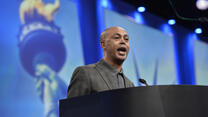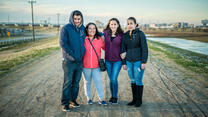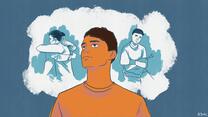
Tolassa Elemaa, 36, has always dreamed of being a world-class runner.
He was well on his way, training with elite athletes as a teenager in Ethiopia. But his dream was halted after he was imprisoned for speaking out against his government.
Now, as a refugee in the United States, Tolassa is able to pursue his dream once again. On Nov. 4, 2018—less than a year after being resettled by the International Rescue Committee in Dallas—he completed the globally prestigious TCS New York City Marathon.
Tolassa was supported by IRC staff, a local running club in Dallas, and the #TeamTolassa social media movement, which was kickstarted by Dallas filmmaker Andrew Holzschuh’s short movie about Tolassa, “He’s Still Fast.”
“I’m very happy to be part of a marathon with people from all over the world,” Tolassa says. “I thank the IRC for giving me the opportunity to participate.”
This is his story.
Elite athlete in training
Tolassa hit the ground running at 12 years old, competing with friends and winning races at school.
“I thought running was a gift,” he says. “Even though I was young, I gained respect from people because of my talent.”
After 5 years in prison for speaking out against his government and less than a year safe in the U.S., this elite athlete—and refugee— just ran his first @nycmarathon. Watch and RT his powerful story! #StandWithRefugees#TeamTolassapic.twitter.com/m53vH0BNIa
— IRC Intl Rescue Comm (@theIRC) November 6, 2018
As a teenager, he was recruited to join the Mugher Running Club, where world champions and recordholders have trained. “My dream was to represent my country,” he says. “People were expecting me to become a famous runner.”
But his burgeoning career was soon cut short.
Political prisoner in waiting
In his early twenties, Tolassa was imprisoned after speaking out against his government in Ethiopia.
“I was worried that I could lose my life,” he says. “I forgot about everything outside of prison—even my athletic career. My concern was to stay alive.”

After five years, he was released on the condition that he cut contact with his family and friends, report his daily activities and whereabouts, and never protest again.
That’s when he decided to flee the country.
To Kenya, then to America
Tolassa and his wife lived in a U.N. refugee camp in Kenya for seven years. He’d hoped to return to his running career, but life was too difficult and his focus remained on surviving. Then he reunited with an old friend who introduced him to a Kenyan athlete who used to train in Ethiopia.
“I started training with them and gradually improved my speed to the point where I started passing them,” Tolassa says. “That gave me reassurance about myself and I became happy again.”
In November 2017, the IRC helped Tolassa, his wife and daughter resettle in Dallas after arriving in America with little more than the clothes they wore. “What I brought is my ability to run,” he says, laughing. Then he adds, “We were very excited to come here.”

The IRC helped Tolassa find a job as a dishwasher at the Adolphus Hotel and connect with other Ethiopian refugees, including extended family members in Texas.
“The IRC is like family to me,” he says. “They are the ones who brought us here, gave us our first home. They filled our house with food and provided us with all the things we needed to settle in. I know they will support other people in the future like they supported me.” IRC staff members also helped Tolassa rediscover something equally precious: his will to run.
Training to overcome turmoil
In Dallas, as he had yeas ago done in Ethiopia, Tolassa joined a local running club.
Several IRC staff members also belonged, and the group would run together every Wednesday morning.
“He trusts people,” says IRC staff member Alex Laywell. “When a lot of things have been taken from him, he still chooses to see the best in people.”

The IRC also connected Tolassa with local runner Josh Millard, who helped him train for the 2018 Rock 'n' Roll Dallas Half Marathon in March. Tolassa placed second in his division, with friends, family and IRC staff cheering him on.
“I was only in this country for four months,” Tolassa says. “To just be a part of the race and do well, I was happy.”
Running helps Tolassa find peace after the turmoil he’s had to endure. It’s evident that there are parallels between what it takes to be a refugee starting a new life and a runner preparing for a marathon. Both require courage, endurance and commitment.
“When I run, my mind is at peace,” he says. “I don’t think about anything else except running. I only think about how many steps I will take, how I can improve my timing.”
Running also helps Tolassa connect with the local community. “In this country, sports will introduce you to other people,” he says. “When you run together, you build a connection with one another.”
Outrunning the stigma of being a refugee
Tolassa is incredibly grateful for the opportunity to rebuild his life in America.
“I came from very difficult circumstances. Now, I live without fear,” he says. “I thank everyone who has supported me to be here.”
He is encouraging his wife to learn English so she can begin working, and he looks forward to helping his daughter in school.
“I want her to be a strong student,” Tolassa says. “I want her to make a difference for herself and the world. That’s what I try to teach her.”

Still, he knows that he and his family face the stigma of being refugees in the U.S.
“Refugees are humans just like everyone else. I want people to know that,” Tolassa says. “Human beings think for one another. That’s what makes us different than animals. We have to love each other.”
For now, he continues to run and train—perhaps for another marathon in the near future.
“If everything works out for me, running is what I want to continue to do,” he says. “I just want to tell everyone who has been helping me, thank you, from the bottom of my heart. If I got the opportunity to represent this country, I would be very happy.”



